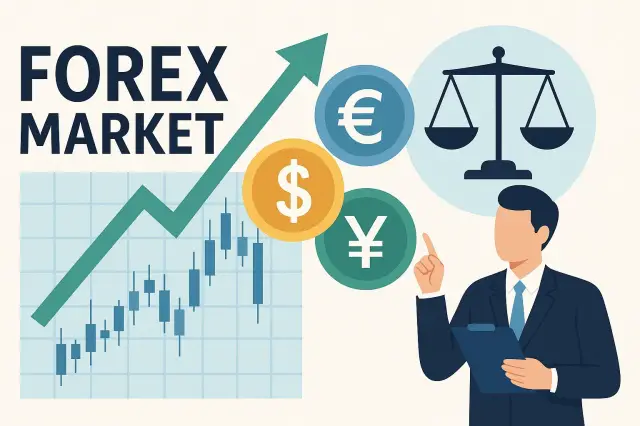The foreign exchange market, commonly known as Forex or FX, is the largest and most liquid financial market in the world. Every day, trillions of dollars are traded globally as individuals, institutions, and governments exchange currencies for various reasons—travel, commerce, investment, speculation, or economic policy.
Despite its size and impact, many people don't fully understand how this market operates or who oversees it. In this article, we explain in simple terms how Forex works, what drives it, and who regulates it to ensure transparency and stability.
Use our currency converter here.
🌍 What is the Forex Market?
Forex is a decentralized global marketplace where currencies are bought and sold. Unlike stock markets, the Forex market has no central exchange and operates 24 hours a day, five days a week, through a global network of banks, brokers, financial institutions, and individual traders.
Currency pairs are traded—for example, EUR/USD (euro vs. US dollar) or USD/JPY (US dollar vs. Japanese yen). The value of one currency is expressed in relation to another, and prices fluctuate constantly based on supply and demand.
🔄 How Forex Trading Works
Forex trading involves simultaneously buying one currency and selling another. Traders aim to profit from changes in exchange rates. For example, if you believe the euro will strengthen against the dollar, you might buy EUR/USD. If the rate increases, you can sell at a higher price and gain a profit.
Forex can be used for:
- Hedging: Companies protect themselves against currency risk.
- Speculation: Traders aim to profit from price movements.
- International trade: Businesses exchange currencies to pay for goods and services.
💼 Who Participates in the Forex Market?
Participants in the Forex market include:
- Central banks: Influence currency supply and stability.
- Commercial banks and institutions: Facilitate large-scale currency exchanges.
- Corporations: Convert profits or payments in international trade.
- Retail traders: Individuals who trade through online brokers.
📈 What Moves the Forex Market?
Several factors influence currency exchange rates:
- Interest rates: Higher interest rates attract foreign capital and strengthen a currency.
- Inflation: Stable, low inflation supports currency value.
- Economic indicators: GDP, unemployment, and trade balances affect investor confidence.
- Political stability: Uncertainty often weakens a currency.
- Market sentiment: Expectations and speculation can cause short-term volatility.
🛡️ Who Regulates the Forex Market?
Since the Forex market is decentralized and global, there is no single regulatory body overseeing all activities. Instead, regulation is handled by national financial authorities in each country where Forex brokers operate. Some of the major regulatory agencies include:
- Commodity Futures Trading Commission (CFTC) and National Futures Association (NFA) – United States
- Financial Conduct Authority (FCA) – United Kingdom
- Australian Securities and Investments Commission (ASIC) – Australia
- Cyprus Securities and Exchange Commission (CySEC) – European Union
- Financial Services Agency (FSA) – Japan
These organizations ensure that Forex brokers operate fairly, protect client funds, follow anti-money laundering rules, and provide transparency.
You can use our financial calculators here.
🧭 How to Trade Forex Safely
If you're considering trading in the Forex market, keep in mind the following:
- Choose a broker regulated by a reputable authority.
- Understand leverage and its risks—high potential gains also come with high potential losses.
- Use demo accounts to practice before risking real money.
- Follow economic news and market analysis to stay informed.
- Never invest more than you can afford to lose.
The foreign exchange market is a dynamic and essential part of the global economy. It connects countries, companies, and individuals through currency transactions that happen every second. While it offers opportunities for profit, it also requires knowledge, caution, and responsibility.
Understanding how Forex works and who regulates it can help you make informed decisions, whether you're a casual observer or an active participant. Transparency, regulation, and education are key pillars to engaging in this complex yet fascinating market.




